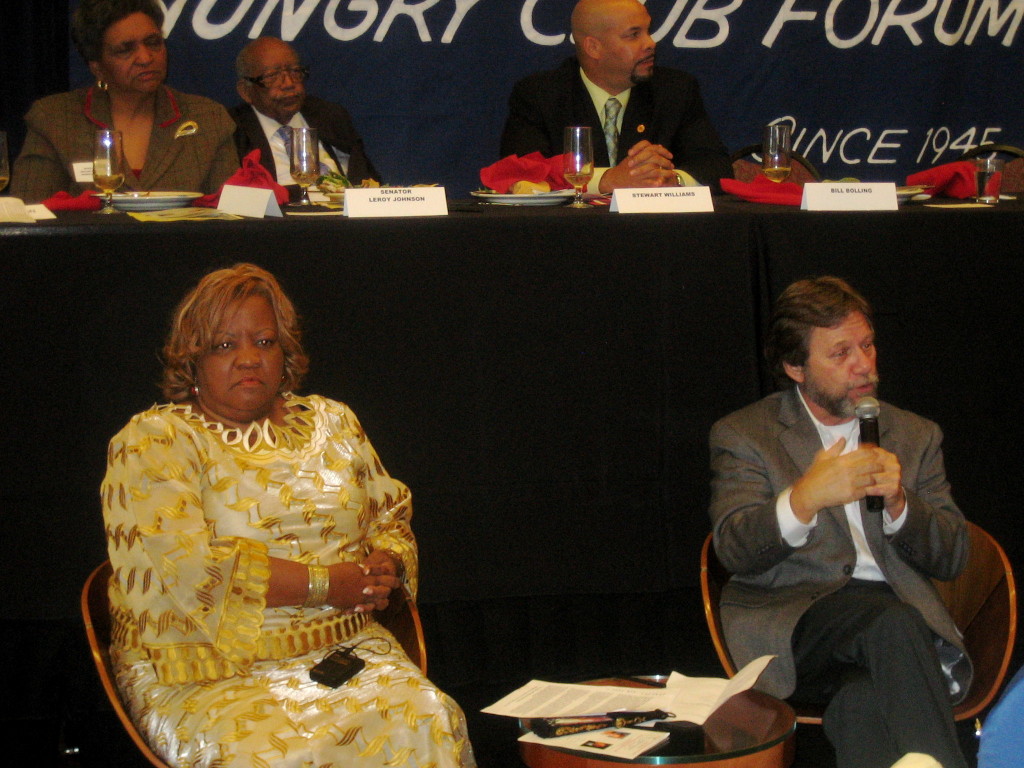Omilami, Bolling Address Hunger at the Hungry Club
Photograph by Jonathan Springston
(APN) ATLANTA — The Butler Street YMCA hosted its weekly Hungry Club Forum in downtown Atlanta on Wednesday, November 18, 2009, and discussed hunger and homelessness.
Since 1945, the Hungry Club Forum has been a weekly forum attended primarily by many of Atlanta’s Black civic leaders. In 2008, APN attended a forum where former State Rep. “Able” Mable Thomas announced her candidacy against US Rep. John Lewis (D-GA).
Last week, Elisabeth Omilami, Executive Director of Hosea Feed the Hungry (HFTH), and Bill Bolling, Executive Director of the Atlanta Community Food Bank, spoke about the spike in demand for all emergency services, including food, in these economic times, which even the government admits to be a recession.
Omilami said current economic conditions are making those HFTH serves feel “like they’re living in a Depression.”
“With a recession, there is some expectations of a quick turnaround,” she said. “The people that we serve dont have that kind of hope.”
Bolling said 40 percent of people receiving services from his organization have full-time jobs.
“The guy who lost his job isn’t that other guy,” he said. “This time, it’s our neighbor, our coworker.”
Bolling and Omilami previously told Atlanta Progressive News in January 2009 that their organizations had experienced unprecedented increases in demand for all services during the 2008 holiday season.
Last Wednesday, each acknowledged the community cannot give what it once could, but expressed the need for continued support to meet the rising demand.
“Everybody can do something with what they have, with where they are,” Bolling said.
The Atlanta Community Food Bank is hosting over 300 food drives throughout the holiday season. Bolling noted there are 150 schools competing with each other to bring in the most food.
“We have to make it fun to give,” Bolling said. “It can be fun to help people. It can be more fun if it can be meaningful.”
Omilami argued it is important for the next mayor to address not only social problems like hunger and homelessness, but also the policy issues which cause them: Atlanta’s shortage of affordable housing, educational inequities, the lack of living wages, and, for some, mental illness.
Due in part to her concern for the loss of affordable housing units in Atlanta, Omilami was one of a minority of Atlanta civic leaders who opposed the mass demolition of Atlanta public housing by the Atlanta Housing Authority in 2007 and 2008.
“You cannot depend on the County Commissions to provide all those services,” she said. “The Legislature comes back in January and the first thing they are going to slash is education. Then they’re going to slash services. Then they’re going to slash healthcare. We have to be in the gap.”
“The City is not mandated to provide any social services,” Bolling said. “The next mayor has to be a regional mayor. There is nothing in our region… that [isn’t] made in the State legislature.”
Meanwhile, a new federal report reveals a record number of American households had trouble putting food on the table in 2008.
The report, published by the U.S. Department of Agriculture, found 14.6 percent of all US households experienced “food insecurity” at least once in 2008 due to a lack of money or other resources.
This rate of food insecurity is higher than the 11.1 percent in 2007 and the highest observed rate since food surveys began in 1995.
One-third of these households had very low food insecurity, which led to the disruption of normal eating patterns for seven or eight months of the year for a few days each of those months.
“In most, but not all households with very low food security, the survey respondent reported that he or she was hungry at some time during the year but did not eat because there was not enough money for food,” the report notes.
The remaining food-insecure homes avoided disrupting eating patterns by utilizing assistance from food pantries, shelters, kitchens, and federal programs.
USDA data reveals the number of Americans participating in the Supplemental Nutrition Assistance Program (SNAP), formerly known as the Food Stamp Program, increased from 27.7 million in January 2008 to 31.7 million in December 2008.
As of the end of August 2009, 36.4 million Americans are receiving SNAP assistance, more than at any time in the program’s history.
The Obama Administration expanded SNAP benefits earlier this year and the President signed a bill in October that invests $85 million in new strategies to prevent children from experiencing hunger during the summer.
The USDA report notes over 500,000 households with children experienced very low food security in 2008, up from 323,000 households in 2007.
“In some households with very low food security among children, only older children may have been subjected to the more severe effects of food insecurity, while younger children were protected from those effects,” the report notes.
Fifty-five percent of all food insecure households said they participated at least once in SNAP, the National School Lunch Program, or Special Supplemental Nutrition Program for Women, Infants, and Children (WIC).
About the author:
Jonathan Springston is a Senior Staff Writer for Atlanta Progressive News and is reachable at jonathan@atlantaprogressivenews.com.
Revised syndication policy:
Our syndication policy was updated June 2007. For more information on how to syndicate Atlanta Progressive News content, please visit: http://www.atlantaprogressivenews.com/extras/syndicate.html